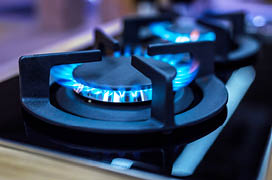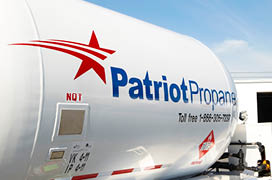As two of the most popular fuel choices to heat your home, it pays to get the facts about propane and natural gas before weighing up the pros and cons of using either one to heat your home or provide your home comforts.
What’s the difference between natural gas and propane?
- Propane is a fossil fuel, a hydrocarbon and over 95% of it used in the US is produced in North America.
- Propane has no toxicity to harm the environment and may be a better choice if you value “green fuel” more than greenhouse gases.
- Propane also is called “liquefied petroleum gas,” or LP gas. Like natural gas, it’s odorless so processing adds an odor so people can detect its presence.
- Propane also fuels some specially configured cars and trucks, producing 30% – 90% less carbon monoxide than typical automotive gasoline.
- Natural gas also is a fossil fuel, created millions of years ago from ancient plants and animal matter which decayed under the pressure and heat underground.
- Natural gas is a “clean energy alternative,” since it’s clean burning, producing less harmful emissions than other fossil fuels (oil and coal) but it is also a greenhouse gas when released into our environment.
How do propane and natural gas compare for homeowners?

BTUs
- One cubic foot of propane = 2,516 BTUs. One cubic foot of natural gas = 1,030 BTUs.
- If your natural gas costs $15.00 per 1,000 cubic feet, the same $15.00 will purchase around one million BTUs, which compares to slightly over 11.20 gallons of propane.
- If propane costs $2.50 per gallon, using this example, then natural gas is the more economical choice.
Cost
Safety
- Lighter than propane, natural gas dissipates more quickly than propane when released into the atmosphere.
- Propane takes a little longer to vanish in the air.
Energy efficiency
- Propane delivers more BTUs (per gallon or per cubic foot), burns less volume per hour than natural gas by a factor of two-to-one and this makes it an energy-efficient alternative to natural gas for many applications.
- Depending on natural gas prices (per 1,000 cubic feet), propane could replace natural gas as a source of heating a building, home, or large volume structure.
- But, if natural gas prices are cheaper (e.g., under $20 per 1,000 cubic feet), the cost of using it to heat a home can be cheaper than propane, even with the efficiency difference.
Going green
- Natural gas is a clean burning greenhouse gas.
- Propane is not toxic or damaging to the environment, is considered a “green fuel” and is eco-friendly before and after combustion.
Conclusion

Weighing up the pros and cons of each fuel, if you like using propane in your home, it’s probably smart to keep doing so, as it delivers more BTUs for your money. However, if having a clean burning fuel is a key point for you, both share similar attributes and benefits, so it may simply be a more personal choice. If you do ultimately decide to convert from propane to natural gas, please keep the following in mind before moving ahead with this major project:
- Converting all propane appliances to natural gas is not cheap.
- You will need to dig up areas around your home to remove the propane line and put in a natural gas line safely.
- You will need to organize and pay for the removal and disposal of your propane tank.
- If you do switch to natural gas, a benefit is that you only pay after you use the natural gas, since there is no fuel stored in a tank for future use.
- Most natural gas appliances will still function and not be affected by power outages.
Have any more questions about converting? Or about propane and natural gas? Please give us a call. We can handle all your home propane needs.
Whether you use propane or natural gas in your home, you can rely on Patriot Propane for everything you need.
